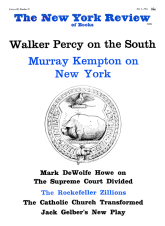In response to:
An Interview with Igor Stravinsky from the June 3, 1965 issue
To the Editors:
Dangers of brilliant style: Stravinsky expressed himself so amusingly in his interview (June 3) that the readers are necessarily tempted to treat his judgments as spiritual whims and paradoxes, whereas what he says in substance is true, is important and has not been said before, or least not as forcefully, and not by such an eminent authority. Thank you for obtaining the interview. One little example of how bad the coverage of our musical news is in New York: the most widely read paper devoted not only news reports (before, during and after) to Horowitz’s recital, but a long interview in one Sunday magazine section and a “causerie” on the following Sunday—while completely ignoring Richter’s last Carnegie Hall recital, of which there was not even a factual report that it had taken place. The “causerie” contains the statement (which must seem as monstrous to Horowitz as it does to us) that Horowitz “represents a period in which the artist was supposed to take all kinds of liberties with the music.” The author refers to Liszt and to Leschetitzky and his pupils (of whom the best known was Artur Schnabel!) and fails to realize (1) that Liszt made a sharp difference between editing and transcribing (viz. his meticulous editions of Weber’s and Schubert’s works with a minimum of cautions alternate suggestions printed in smaller type); (2) that Horowitz belongs to the generation after Rachmaninoff and Busoni who except in transcriptions never tampered with the score markings.
Konrad Wolff
New York City
This Issue
July 1, 1965



